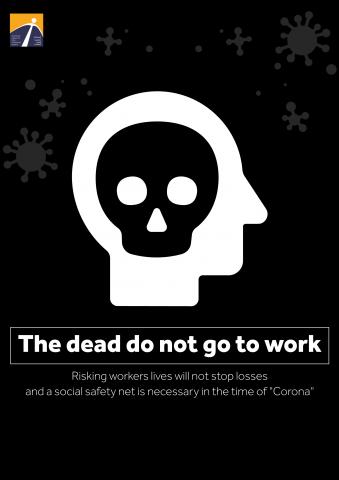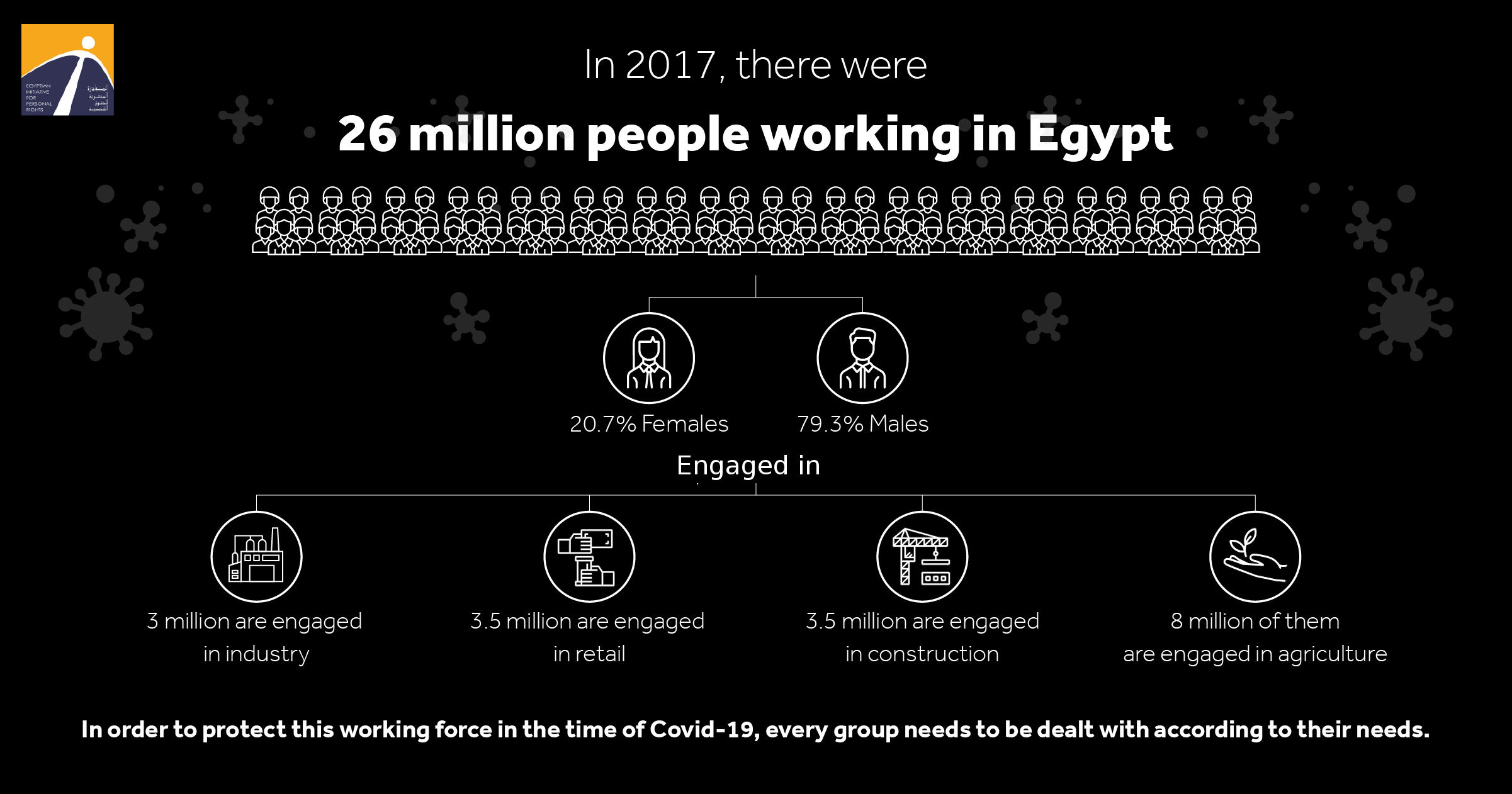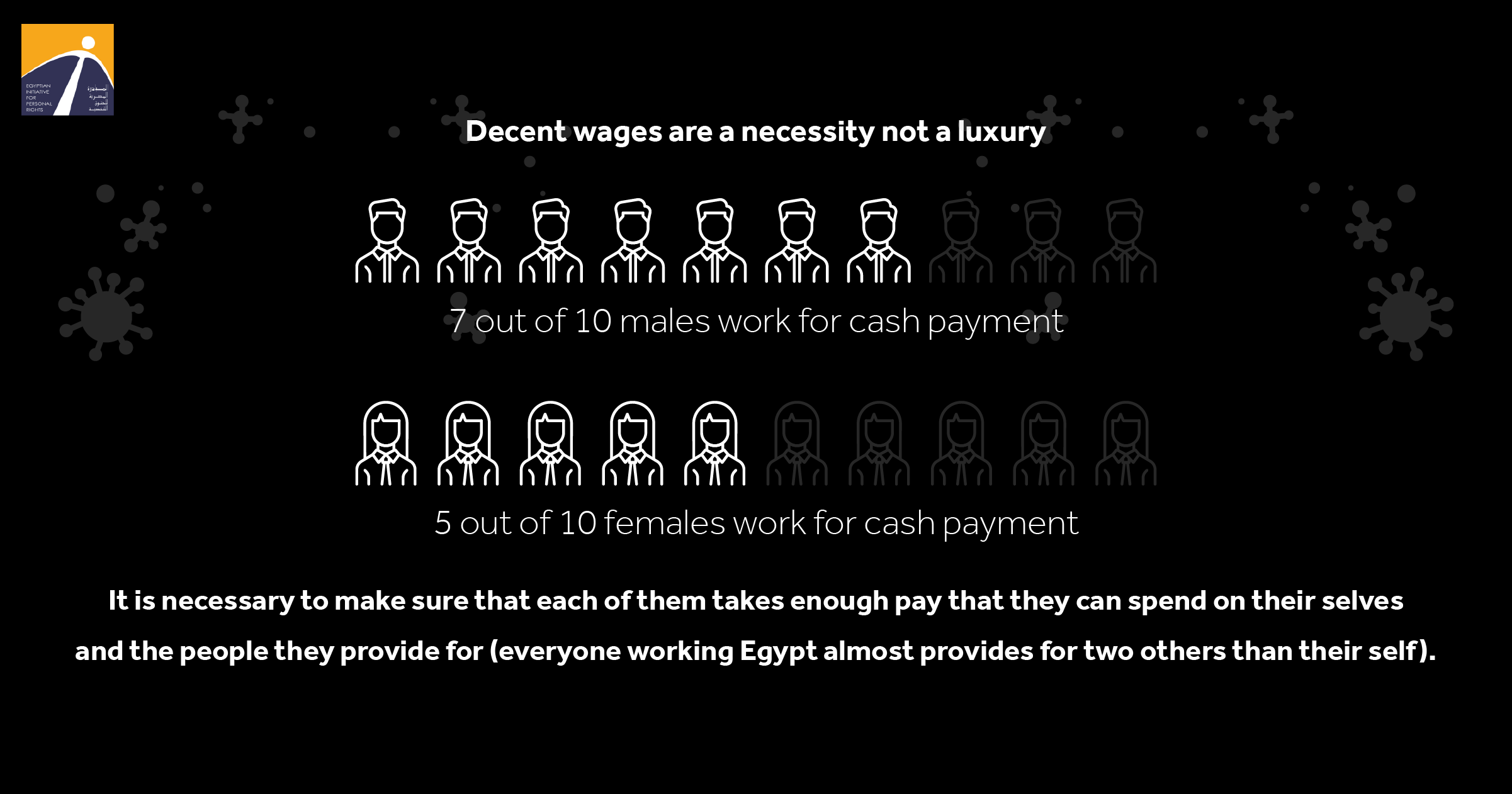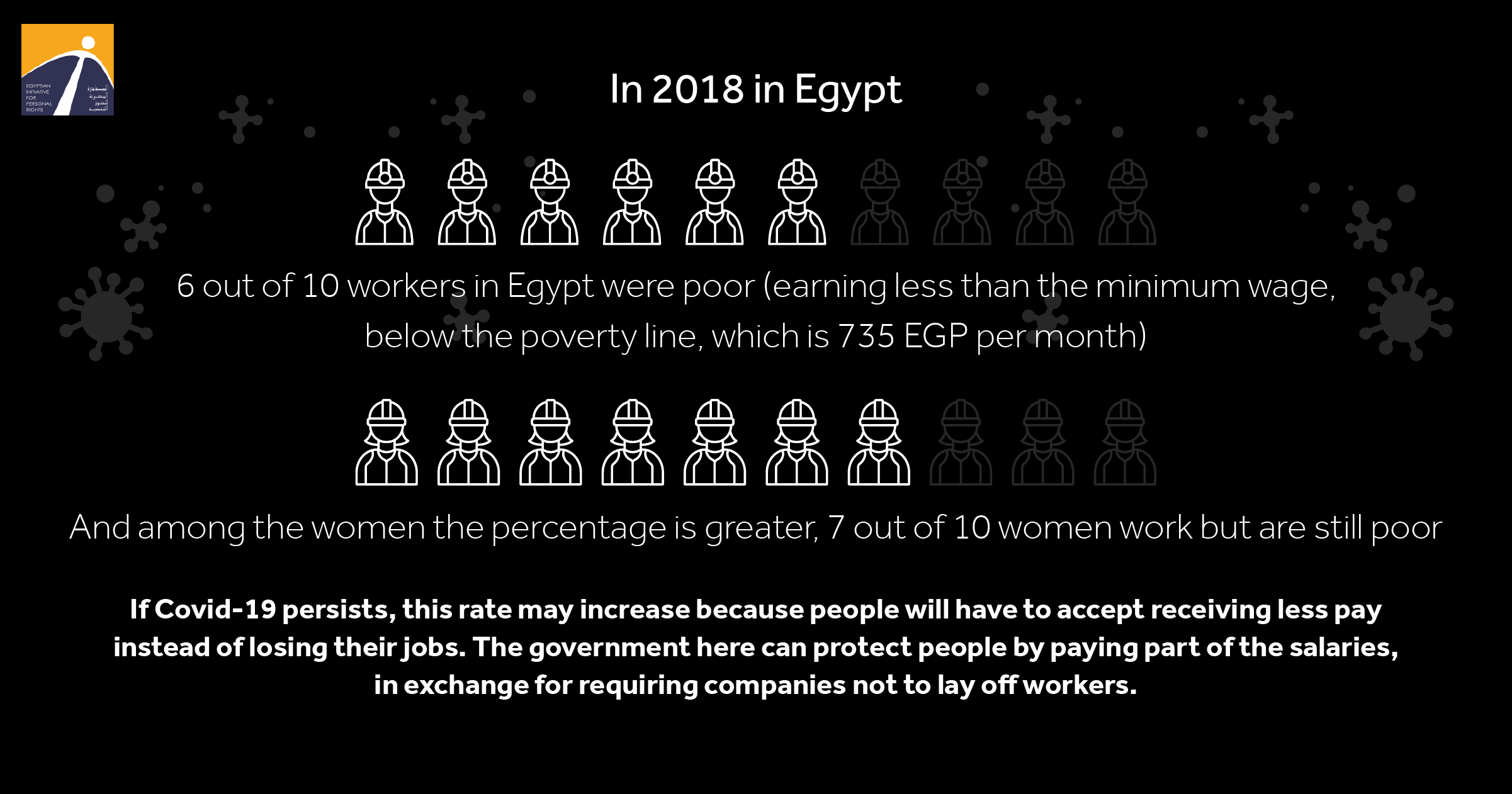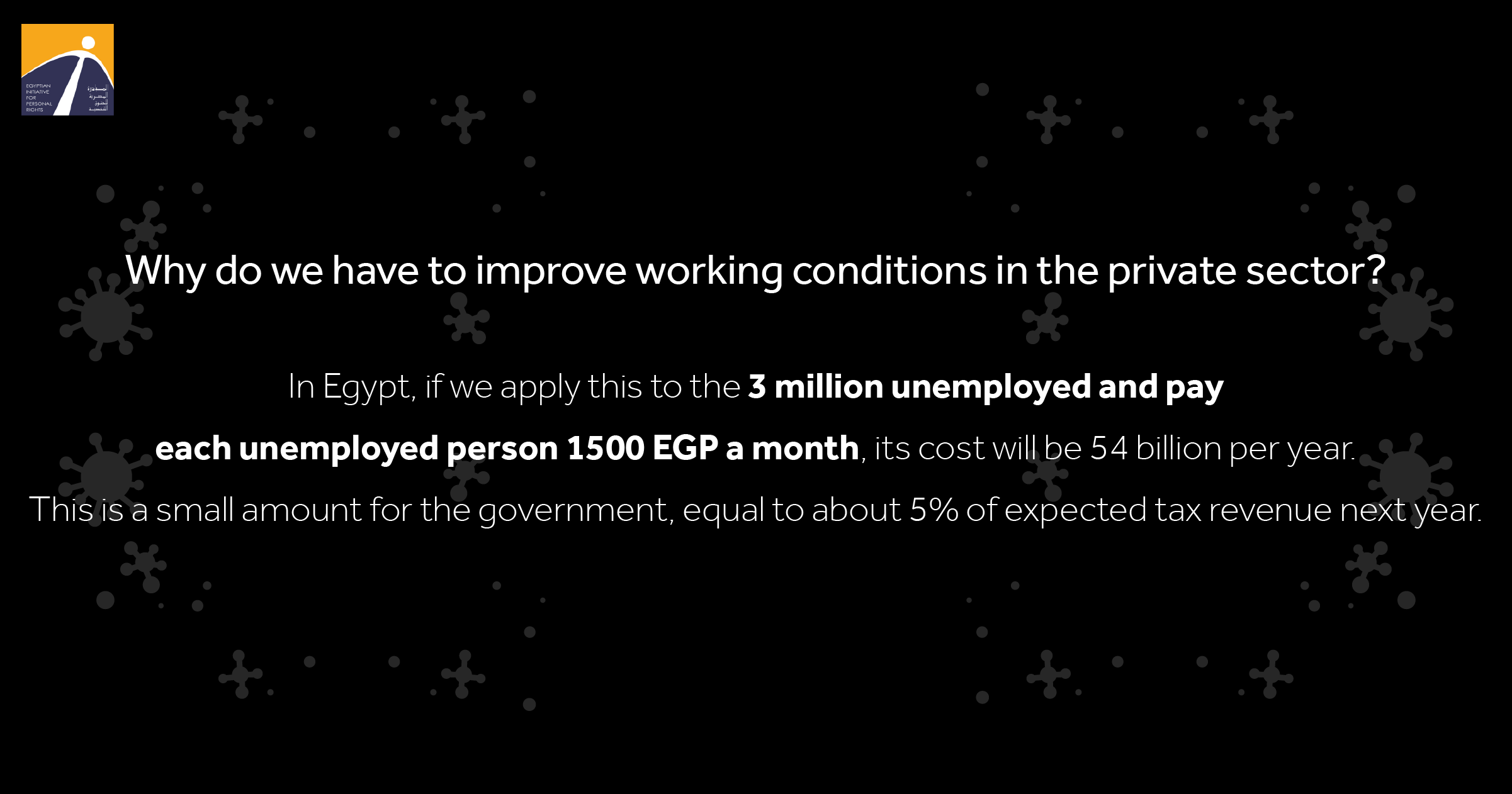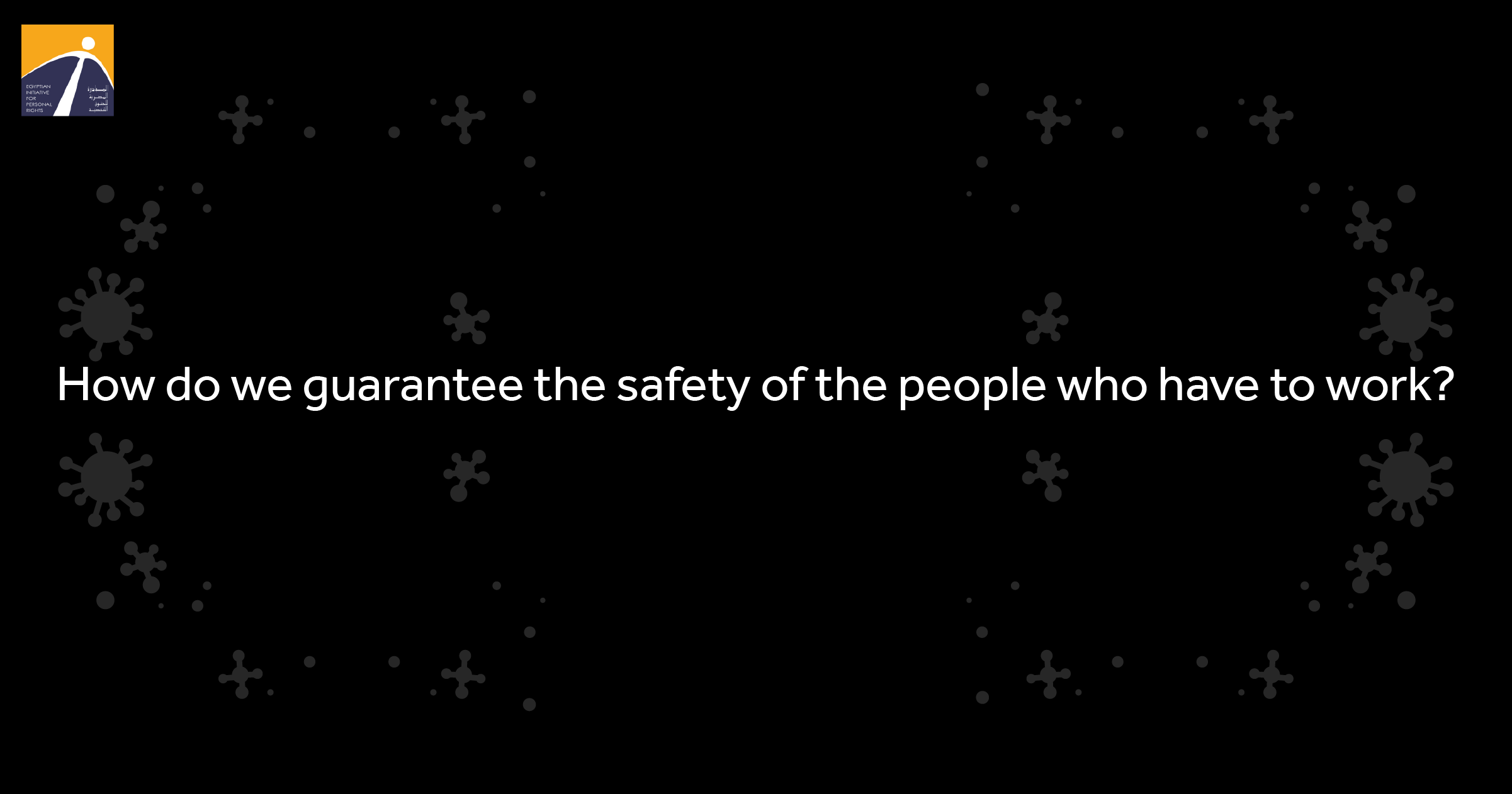"The dead do not go to work" Risking workers lives will not stop losses and a social safety net is necessary in the time of "Corona"
The government calls on citizens to stay at home to prevent the spread of the Covid-19 pandemic, but insists that work in the construction sector should not be interrupted, despite postponing the opening of national projects to 2021. It also agreed to exclude workers in the industrial private sector from the curfew.
Meanwhile, private sector companies insist on postponing the complete closure, and did not agree to a temporary closure of factories operating in non-vital sectors or reducing the number of shifts, as the government did in its own sectors and subsidiaries, even if this is at the expense of the lives of Egyptians. What is meant here is not vital sectors that are essential to continue working, such as food and health products, but rather all sectors.
With the continued spread of the virus, it is expected that demand for products, especially unnecessary products, will decrease, which exposes these companies to a decrease in their revenues or losses, when people do not buy their products. The Egyptian law allows any employer to fire his employees, without any compensation or pension. When a worker gets sick, and he is the provider for his family, he often does not have health insurance that guarantees his treatment.
- Is now the time to preserve profits or lives? And if production continues at the same rates and hundreds of thousands of workers die, will there remain anyone to produce these goods and services? Of course not, as the former head of research at the World Bank, Branko Milanovich says, because "the dead don't go to work."
- And if the workers remain in their homes without compensating them financially, who can buy these goods and services?
- There are 2 billion citizens around the world -more than a quarter of humanity– staying at home, for protection against the evil of Coivd-19. Why does Egypt not follow the same standards of protection?
The following points attempt to draw a picture of the labor market in Egypt, and point out its key shortcomings and imbalances, which are exacerbated with the crisis of Covid-19. The crisis, at the same time, opens a door for discussion and redress for some of these imbalances.
1- Where do people work?
- In 2017, there were 26 million people working in Egypt. More than three quarters of them are males. 8 million of them are engaged in agriculture. About 3.5 million are engaged in construction, almost the same figure in retail and 3 million in industry.
- In order to protect this working force in the time of Covid-19, every group needs to be dealt with according to their needs.
2- Decent wages are a necessity not a luxury
-
7 out of 10 males work for cash payment, and 5 out of 10 females work for cash payment
-
It is necessary to make sure that each of them takes enough pay that they can spend on their selves and the people they provide for (everyone working Egypt almost provides for two others than their self).
-
The government pays a minimum salary of 2000 EGP in order for its employee to fulfill his basic needs. The private sector is required to pay the same amount.
-
By applying this, we save the government the amounts of aid it pays to the poor.
-
In 2018, 6 out of 10 workers in Egypt were poor (earning less than the minimum wage, below the poverty line, which is 735 EGP per month).
-
And among the women the percentage is greater, 7 out of 10 women work but are still poor.
-
Among young people, it is 7 out of 10, and the same percentage among workers in the agricultural sector.
-
If Covid-19 persists, this rate may increase because people will have to accept receiving less pay instead of losing their jobs. The government here can protect people by paying part of the salaries, in exchange for requiring companies not to lay off workers.
4- Why do we have to improve working conditions in the private sector?
-
The private sector is not just to its workers. Private sector companies, offices, shops, hospitals, and schools provide work for 1 out of every 4 Egyptians working.
-
Those workers help the owners of the companies earn great profits, but in return the companies do not guarantee them decent working conditions.
-
Out of every 10 workers in the private sector, 7 work without a contract that protects them and without knowing their rights and duties. There are 7 who are not insured, meaning, they do not have health insurance to treat them when they are sick and no pension when they grow old.
-
Conditions are much worse in the informal sector, such as small workshops or small shops in informal settlements. This sector provides work for 2 of every 4 working Egyptians.
-
In order for the government to protect workers, it might start a campaign that encourages small and large private sector businesses to sign contracts with workers, and in exchange the government pays health and social insurance for a year for each worker.
5- Why are unemployment benefits important in Egypt?
-
As the pandemic spreads, the number of people who lose their jobs will increase. People need help with their basic needs.
-
In developed countries, governments pay unemployment benefits, and they finance them from taxes.
-
In Egypt, if we apply this to the 3 million unemployed and pay each unemployed person 1500 EGP a month, its cost will be 54 billion per year. This is a small amount for the government, equal to about 5% of expected tax revenue next year.
-
This is an amount that the government has promised to pay to the owners of tourism and aviation companies, as compensation for losses caused by Covid-19. But in the case of unemployment benefits, the money will go to a large number of people, whose income is already low and their ability to cope with crises is limited.
-
This is a humanitarian necessity and also an economic necessity, because it maintains a portion of people's incomes so that they are able to still buy their basic necessities, and so be able to still maintain economic growth.
6- Before Covid-19: Jobs were not enough
-
In 2018, the economy achieved growth of about 6%, but it did not benefit a large number of people or companies.
-
15,000 new companies were founded. But the number of people who lost their jobs was nearly equal to the number of people who got jobs. About 600,000 young men and women were tired of looking for work and lost hope, and 3 million people were looking for a job, but couldn’t find any.
-
That means: the five trillion-pound economy created a net of only 15,000 jobs, which is the lowest number since 2011.
-
Now more than ever, we need to review the growth model Egypt is following, and focus on growth that creates jobs.
7- How do we guarantee the safety of the people who have to work?
-
The keyword is to reduce crowding. This means that anyone who can stay at home, stays at home. They must be given an income that covers their basic needs. The government did this with its employees. In addition, it was decided to give 500 EGP per month for irregular employment and these are about 300,000 citizens.
-
Those who have to go to work, are making a great sacrifice to provide us with invaluable service. It is necessary for them to find uncrowded, cheap or free transportation, which is a necessity the government must provide.
-
It is necessary that in the workplace only few people are allowed at a time, which would than allow social distancing. The government promised to apply that with construction workers who work in infrastructure and national projects, so they work in shifts. The private sector did not clarify its position and demanded that the government leaves it to decide for itself.
-
All procedures have costs. Part of the costs that must be borne by the employer, according to their size and capabilities, the most important of which are disinfectants and health protection tools, and organizing non-crowded shifts. Other parts are borne by the government, the most important of which are safe, clean, free transportation, unemployment benefits and health insurance.
-
The best way to harmonize the need for work with protection from the pandemic is through negotiation. Each sector and every industry discusses the suitable ways with representatives of its employees under the supervision of the government.

